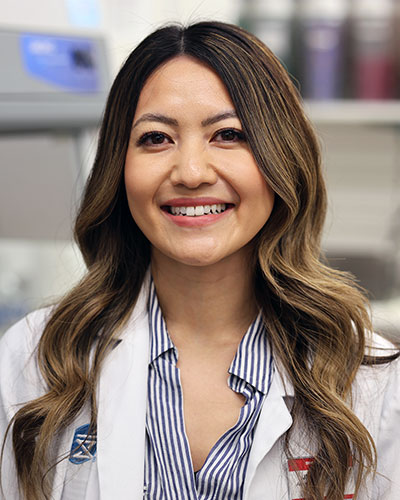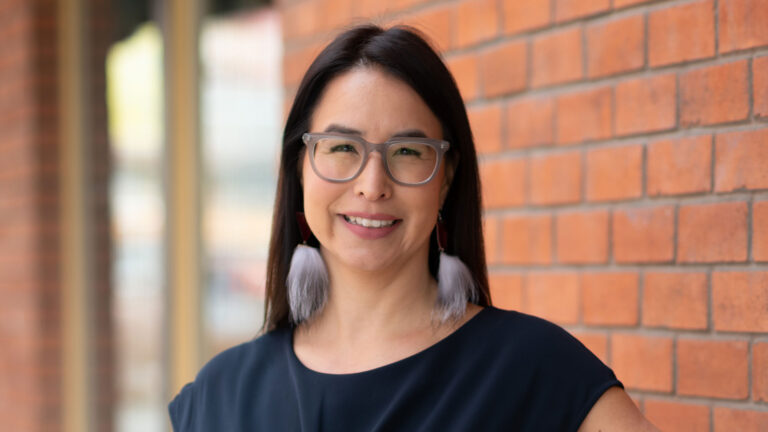
When the new Standards for the Operation of Licensed Pharmacies (SOLP) were developed, ACP considered feedback from a diverse group that included pharmacy technicians, pharmacists, and licensees to ensure the new standards reflected and supported real-world pharmacy practice. For instance, the requirements for compounding services were updated to better align with the modern pharmacy landscape.
Previously, all pharmacies were required to meet Level A non-sterile compounding requirements. In other words, all pharmacy teams had to be equipped with the facilities, training, policies, and resources to prepare simple and moderate compounds, such as 1:1 mixtures of creams. Every pharmacy had to meet these requirements, even if they worked with a compounding and repackaging pharmacy to order all compounded products.
What is a compounding and repackaging pharmacy?

Compounding and repackaging pharmacies focus on preparing compounded or repackaged medications. Jenny Vuong is the licensee at Shoppers Drug Mart, Terra Losa Centre, a pharmacy in Edmonton that holds a compounding and repackaging licence. Jenny explained what these pharmacies do.
“Compounding and repackaging pharmacies are licensed to prepare customized medications or repackaged prescriptions for other pharmacies rather than directly serving the patient,” she said. “These pharmacies often have enhanced infrastructure, special equipment, and dedicated facilities to meet the standards approved by ACP. This may include things like negative pressure rooms, containment hoods, and other equipment. While community pharmacies primarily focus on patient care and dispensing, compounding and repackaging pharmacies can operate as support hubs.”
Jenny’s pharmacy has agreements with pharmacies across the province to deliver compounded or repackaged medications. She said these agreements can help community pharmacy teams and patients.
“These agreements can allow the community pharmacy to streamline their operations, save valuable time, and focus more on direct patient care,” said Jenny. “I think one of the most impactful benefits is giving patients access to compounded medications that community pharmacies may not have the resources or equipment to prepare themselves.”
Jenny said compounding and repackaging pharmacy teams often have additional training to produce more complex compounds.
“Oftentimes, compounding can be complex. Our pharmacy team has extensive training in compounding. They learn about solubility, stability, compatibility, pharmaceutical calculations, and quality control principles,” said Jenny. “Our team also undergoes months of hands-on training so they can apply the knowledge into practice and master all of the techniques and safety protocols required for compounding.”
Community pharmacies working with compounding and repackaging pharmacies

When Oluwaseun (Seun) Ogungbile took over as a first-time licensee at Shoppers Drug Mart #2332 in Canmore in 2023, she decided to order all compounded medications from a compounding and repackaging pharmacy. While her pharmacy was equipped to prepare Level A compounds, she felt working with a compounding and repackaging pharmacy would enable her team to focus on working with patients.
“My first goal was to enhance our patient care, so we really had to streamline our workflows to achieve that,” said Seun. “I resolved to outsource ancillary tasks, such as compounding and repackaging, to subject matter experts in order to allocate the necessary time and resources towards enhancing our core patient care initiatives.”
Once she decided to enter into an agreement with a compounding and repackaging pharmacy, Seun started looking for the right fit. She was committed to finding a pharmacy that demonstrated professionalism, had strong communication, could meet requests in a timely manner, and produced high-quality products.
“I started by asking colleagues for recommendations and connected with a few different pharmacies,” said Seun. “Eventually, I connected with Jenny’s pharmacy and I found they delivered high-quality products, quick turnaround times, and great communication,” said Seun. “It was the first big decision I made as a licensee, and I think it was one of my best decisions so far.”
Listening to feedback and updating standards
The scenario described above—where pharmacies were meeting compounding requirements despite not performing compounding and instead obtaining all compounded medications through agreements with compounding and repackaging pharmacies—prompted ACP to reconsider the requirements in the standards.

“We heard from licensees like Seun who had to meet compounding requirements but were not compounding in the pharmacy,” said Jeff Whissell, ACP’s Deputy Registrar. “These licensees were putting time and resources into meeting requirements—they had to provide training, develop policies and procedures, and complete risk assessments related to compounding and repackaging. These tasks took time away from working with patients, so we responded to that feedback and updated the requirements.”
In the new SOLP, the requirement for pharmacies to perform at least Level A compounding in-house has been removed. The new SOLP require that all licensed pharmacies must provide patients access to compounding services that are appropriate, safe, and of high quality, but pharmacies may meet this obligation by either performing compounding directly in the pharmacy in accordance with the compounding standards, or through an agreement with a pharmacy located in Alberta that holds a compounding and repackaging licence.
“Now, pharmacies can partner with their colleagues through an agreement and no longer be required to maintain the policy framework, infrastructure, and training to compound,” said Jeff. “In some cases, these partnerships make the best use of regulated members’ expertise—the pharmacy teams who provide the compounds will have greater expertise in compounding and the folks in the community pharmacy can focus on providing other types of care.”
One important consideration is that even if the community pharmacy only compounds rarely, they need to maintain competence and acceptable performance with Level A compounding. If the pharmacy team does not want to meet the compounding requirements, they must obtain all of their compounded and repackaged products from a compounding and repackaging pharmacy. Licensed pharmacies that choose to not perform any compounding must report this to ACP. More information about this process is coming soon.
Seun thought this change to the standards made sense.
“I was pleased to see this change in the standards. It’s been over a year since we’ve compounded at all in our pharmacy and it has really expanded our capacity to deliver person-centred care,” said Seun.
For example, Seun’s pharmacy team has more time to provide timely care to new patients.
“Canmore is a tourist location, so a number of our patients require immediate and walk-in services,” said Seun. “Because we’ve outsourced compounding, it has freed up our team to accommodate the needs of our community and provide timely, efficient, quality care. This partnership has become a fundamental part of our pharmacy operations.”
Seun added that this agreement has also allowed them to provide a wider range of high-quality compounded products for patients.
“When I do the final check of the products that are delivered from Jenny’s pharmacy, I’m confident that it’s a quality product that I would be able to trust if I was the patient.”
Completing a separate final check prior to dispensing the compounded or repackaged medication to the patient is an important component of a successful partnership between a community pharmacy and a compounding and repackaging pharmacy. Even when drugs are prepared by a trusted compounding and repackaging pharmacy, the pharmacist who works with the patient must always complete a final check before dispensing the medication.
Agreements between community pharmacies and a compounding and repackaging pharmacies are one consideration for pharmacy teams as they think about how to best deliver person-centred care in alignment with the new standards. Jeff added that he hopes this change to the standards will help streamline workflows for licensees like Seun who choose to outsource compounding and repackaging services.
“We recognize that licensees have a pretty full plate when it comes to their responsibilities,” said Jeff. “This change will hopefully lessen the burden and increase flexibility for some licensees.”




